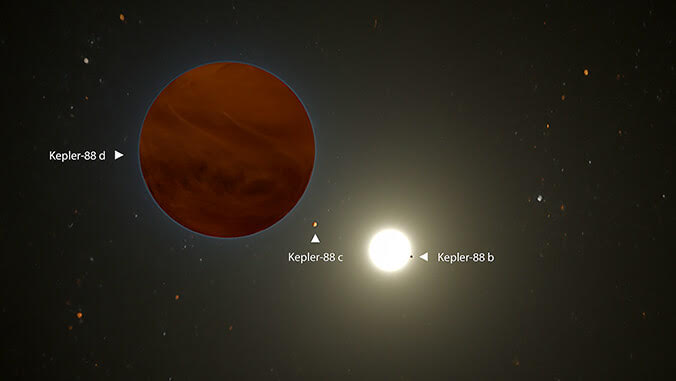
Our solar system has a king. The planet Jupiter, named for the most powerful god in the Roman pantheon, has bossed around other planets through its gravitational influence. With twice the mass of Saturn, and 300 times that of Earth, Jupiter’s slightest movement is felt by all the other planets.
University of Hawaiʻi Institute for Astronomy (IfA) astronomer Lauren Weiss has discovered a planet three times the mass of Jupiter in a distant planetary system. Kepler-88 d is the most massive planet in the system Kepler-88. The gigantic extrasolar planet orbits its star every four years, and its orbit is not circular, but elliptical. Weiss is the lead author on the discovery based on six years of data taken at W. M. Keck Observatory on Maunakea. Kepler-88 d was found using the High-Resolution Echelle Spectrometer instrument on the 10-meter Keck I telescope.
“So maybe Kepler-88 d is the new supreme monarch of this planetary empire—the empress.” —Lauren Weiss
The newly discovered planet adds another dimension to astronomers’ understanding of the system more than 1,000 light-years away from Earth. “At three times the mass of Jupiter, Kepler-88 d has likely been even more influential in the history of the Kepler-88 system than the so-called King, Kepler-88 c, which is only one Jupiter mass,” said Weiss, a Beatrice Watson Parrent Postdoctoral Fellow at UH IfA. “So maybe Kepler-88 d is the new supreme monarch of this planetary empire—the empress.”
The Kepler-88 system was already famous among astronomers for two planets that were previously discovered. Kepler-88 b and c orbit much closer to the system’s star. The previously discovered outer planet, Kepler-88 c, is 20 times more massive than planet b, and so its force results in dramatic changes in the orbital timing of the inner planet.
The outer planets may have had as much influence on the Keppler-88 system as Jupiter did on our solar system by promoting the development of rocky planets and directing water-bearing comets toward them. Weiss and her colleagues are searching for similar kingly planets in other planetary systems with small planets.
Her discovery team’s paper is published in The Astronomical Journal.
For more go to UH IfA news release.


